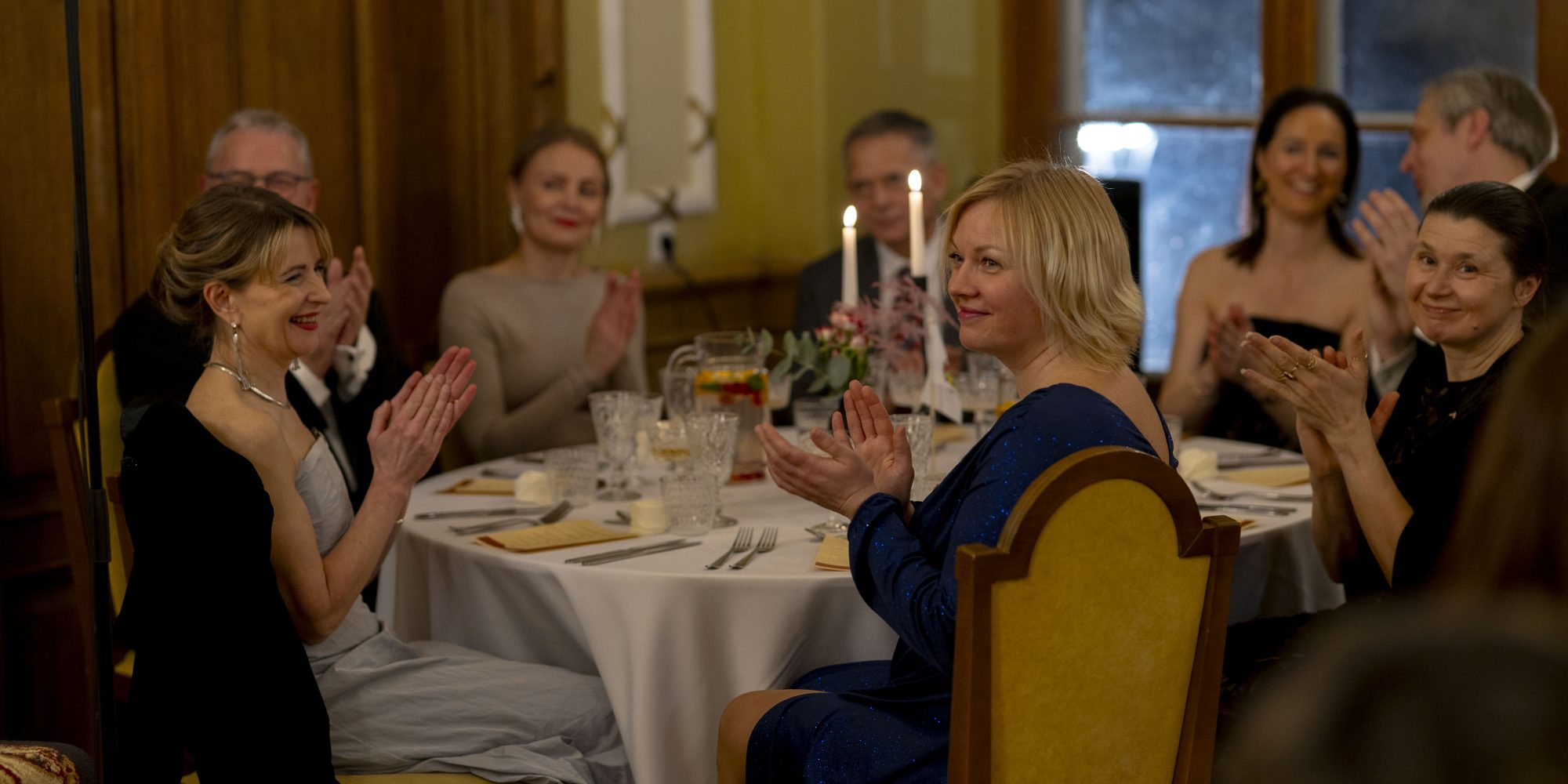Original article at Põhjarannik (in Estonian): Mäetaguse mõis sai Taani kuningliku jahisööminguga kuninglikult hakkama
“King Frederik sends a message that tonight, you may feel truly royal,” joked Estonia’s honorary consul in Denmark, Filip Dalthur Rasmussen, as he welcomed guests arriving at the Mäetaguse manor house to experience the Danish royal hunting feast over two evenings—a grand tradition that still lives on in Denmark and was brought to Estonia for the first time.
Last summer, when Filip Dalthur Rasmussen called Sander Reelo, the head of the SPA hotel Von Rosen at Mäetaguse Manor, he had two questions: First, could Estonia host a royal hunting banquet—a centuries-old Danish tradition? And second, where could it take place?

Sander Reelo answered the first question with a “yes.” As for the second, he responded with a question of his own: “You’re calling me and expect I’d suggest anywhere else? Let’s do it here!”
Reelo had no idea what he was getting into, but he knew that Mäetaguse Manor had always been a place that honored the art of celebration. “Once, the manor lord had a birthday, and although the manor burned down the day before, the party still went on. Tonight, the building is intact, and the party will go on!”

Crowning the Royal Hunt
Filip Dalthur Rasmussen explained the concept of the royal hunting banquet—a lavish feast that followed royal hunts in Danish manors, often attended by the king himself. The evening meal featured the game caught during the hunt. While the nobility enjoyed the finest delicacies in their elegant attire, locals would peek through the windows, eager to catch a glimpse of the king and his esteemed guests.

“The tradition lives on, albeit in a slightly different form, as we still have a royal family—one that Danes, unlike the British, truly love and deeply respect. Tonight, you are King Frederik’s noble guests,” Rasmussen said to the audience.
He added that it was a great honor to organize the event specifically in Ida-Viru County, as he had been working closely with the local tourism sector for nearly two years.

“I’ve both inspired and been inspired. The people here are positive and full of energy. Ida-Viru County wants more tourists and has decided to become the most hospitable region in Estonia. Almost all members of the tourism cluster signed a hospitality agreement because they want to be winners. That’s a great decision.”
Rasmussen noted he had spent more than 25 years fostering business, education, and cultural ties between Estonia and Denmark.
“It’s important we stay close, as we have so much in common and so much to learn from each other. In today’s conflict-ridden world, small countries must stand together,” he said, also referencing the legendary tale of how the Dannebrog flag fell from the sky during a battle in Tallinn in 1219, granting the Danes victory.
The Mäetaguse Nobility Arrived During Danish Rule
Event host Mart Sander explained that the former owners of Mäetaguse Manor, the von Rosen family, were among the first noble families to arrive in Estonia—already during the Danish era.
“The first Rosens came to Estonia just 18 years after the Dannebrog descended from the sky. And considering that the last of them left for Germany in 1939, you could say this family was connected to Estonia for 700 years. It’s hard to consider Baltic Germans as our own, but anyone who spent 700 years here cannot be a stranger either.”
The von Rosen family will gain even more attention this summer through Mart Sander’s play “The Rose Key” (“Roosivõti”), which was born in the mind of the well-known musician, director, writer, and filmmaker almost instantly. In early January, he had performed in the region with singer and actress Triin Lellep and stayed overnight at Mäetaguse Manor. After a tour of the manor complex, inspiration struck, and it was clear something had to be staged or filmed there.

“The ideas started flowing immediately, and by the time we drove back to Tallinn from Mäetaguse, I already had a pretty good vision of what would happen here,” said Sander. The play “The Rose Key,” which delves into the secrets of the von Rosen family’s women, will premiere at Mäetaguse Manor around Midsummer. “All the stories are filled with intrigue and mystery,” Sander confirmed, performing an excerpt with Triin Lellep.
The play “The Rose Key” reaches the stage around Midsummer at Mäetaguse Manor. It centers around General Reinhold von Rosen, who died on a battlefield in Austria in 1555. But what was happening in his wife’s heart back at the manor at that very moment?
The Feast Itself
The dishes were prepared by experienced Danish chef Kim Hemmingsen, who has worked in several restaurants in Copenhagen—among them, one known for hosting grand game feasts in Danish manors. At Mäetaguse, he showcased his culinary artistry by serving dishes made from quail, elk, deer, wild boar, and duck.







